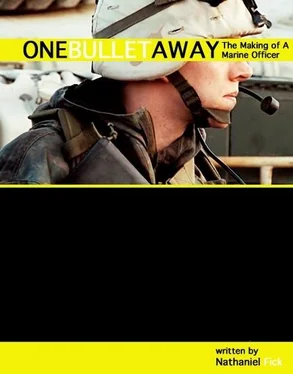The carved band of campaign names stirred me. But it wasn’t the past that gave me pause. It wasn’t the names already engraved. It was all the blank space next to them for battles still unfought. I looked at the expanse of smooth black stone flecked with gold and tried to imagine the names to come. On that quiet night in 1999, it seemed inconceivable that I might be part of them.
The TBS campus, called Camp Barrett, looks more like a dilapidated community college than the cradle of the Marine officer corps. On that first Monday morning, I watched lieutenants hurrying back and forth between classes. They carried brief bags and plastic coffee mugs, like graduate students. Camp Barrett’s dozen anonymous buildings include two barracks, several classrooms, a pool, a theater, and an armory, all surrounded by flat expanses of grass that double as playing fields when not being used as helicopter landing zones.
The compound’s only distinctive feature is Iron Mike, a bronze statue of a Marine holding a rifle in his right hand and waving on unseen men with his left. The name is a misnomer because the figure is actually Lieutenant Colonel William Leftwich. In 1970, Colonel Leftwich had commanded the First Reconnaissance Battalion in Vietnam. We new lieutenants knew nothing of First Recon, except that it boasted the best unit insignia in the whole Marine Corps: a skull and crossbones superimposed on the blue diamond of the First Marine Division, surrounded by the words “Swift, Silent, Deadly.”
Colonel Leftwich had ridden along on every emergency extraction of his reconnaissance teams. These were the most dangerous missions of all — teams calling for emergency extract had usually been compromised and suffered casualties and were being chased by larger enemy forces. After rescuing a team called “Rush Act” on a stormy day, the helicopter carrying Leftwich and his Marines had flown into a mountain-side, killing everyone aboard.
It was next to Iron Mike that our class assembled that morning. I stood by the statue, conscious again that I was being intentionally steeped in the history of the Corps and its heroes. Around me stretched the six platoons of Alpha Company, 224 newly commissioned second lieutenants. A lanky guy with a wry smile stood next to me, and I turned to introduce myself.
He took my hand, saying, “Jim Beal. Tennessee.”
I couldn’t know that morning how much Jim and I would share in the coming two years. I knew only that his laid-back confidence was reassuring, another indicator that TBS would be different from Officer Candidates School. Jim’s barracks room was next to mine. Platoons of forty lieutenants were divided into squads of thirteen or fourteen, and the squads were further divided into fire teams of four or five. Jim and I were half our fire team. We would spend the next six months at Camp Barrett, learning all the basic skills we would need as Marine officers. The Corps’s mantra is “Every Marine a rifleman.” Its corollary is “Every Marine officer a rifle platoon commander.” In the Marine Corps, jet pilots, clerks, and truck drivers are all infantrymen first. TBS would teach us those basic infantry skills, plus all the rules, regulations, and administrative requirements that are part of a peacetime military. The greatest topic of conversation at TBS was MOS selection. Military occupational specialties are the specific jobs in the Corps — aviator, artillery, logistics, tanks, infantry, and others — and they’re competitive. We would be assigned to the various specialties according to class rank. The most coveted of them was infantry.
President Harry Truman once said that the Marines had a propaganda machine second only to Stalin’s. He was right. My impression of the Corps, even as a newly commissioned officer, was one of a lean, mean fighting force, all teeth and no tail. I was shocked when my platoon commander, Captain McHugh, told his assembled lieutenants that only 10 percent of us would be infantry officers. The rest would go to the other combat arms — artillery, amphibious assault vehicles, and tanks — or to support jobs such as supply, administration, and even financial management.
McHugh urged us to keep an open mind and learn about each job before deciding which to compete for. I nodded but knew that only one thing would satisfy me: infantry officer. I wanted the purity of a man with a weapon traveling great distances on foot, navigating, stalking, calculating, using personal skill. I couldn’t let a jet or a tank get in the way, and I certainly wasn’t going to sit behind a desk. I wanted to be tested, to see if I had what it takes. The Marine Corps had recently unveiled a recruiting campaign using the motto “Nobody likes to fight, but somebody has to know how.” It was dropped because Marines did like to fight and aspiring Marine officers wanted to fight.
The grunt life was untainted. I sensed a continuity with other infantrymen stretching back to Thermopylae. Weapons and tactics may have changed, but they were only accouterments. The men stayed the same. In a time of satellites and missile strikes, the part of me that felt I’d been born too late was drawn to the infantry, where courage still counts. Being a Marine was not about money for graduate school or learning a skill; it was a rite of passage in a society becoming so soft and homogenized that the very concept was often sneered at.
During our first week at TBS, Captain McHugh asked us to prepare a list of our MOS choices from first to twenty-fourth. He said he would use the lists while evaluating us over the coming months and would do his best, while remembering the paramount “needs of the service,” to assign us to one of our top three choices. I turned in a paper listing my top three choices as infantry, infantry, and infantry.
“Lieutenant Fick.” The captain had scanned through the sheets and called me to the front of the room. He sounded pained. “Don’t be a smart-ass. Put down three choices.”
“All I want is to be an infantry officer, sir.”
“We don’t always get what we want, Lieutenant. Half the men in this class want to be grunts. The Marine Corps will put you where the Marine Corps needs you. The only way to have your pick of jobs is to graduate first in your class. Do you think you can graduate at the top of this class?”
Remembering my struggle just to graduate at all from OCS, let alone at the top, I chose amphibious assault vehicles and tanks as my second and third choices.
I loved TBS as much as I had hated OCS. Jim joked that the acronym stood for “The Bleeding Sphincter,” but the pace was high, the material was clearly relevant, and we were finally being trained instead of screened. We spent our first month on the rifle range, learning to shoot the M-16 and the Beretta 9 mm pistol. Some of my classmates had been hunters since they’d learned to walk, but I had fired a gun only two or three times in my life. The Marine Corps is a gun club, the infantry most of all, and I realized I was starting with a deficit. I had three weeks to pay attention and learn how to shoot. On the last morning, Qualification Day, we would shoot for score, and the score would determine what shooting badge we wore on our uniforms. Those who barely qualified would be Marksmen, above them were Sharpshooters, and the best riflemen would be Experts.
“It’s like condoms,” Jim explained. “Large, extra-large, and extra-extra-large.”
I laughed, but in my mind no self-respecting infantry officer could stand in front of his first platoon with anything less than an Expert shooting badge.
The Marines’ known-distance shooting course features slow and rapid shots at human-size targets from two hundred, three hundred, and five hundred yards. Slow shots work out to about one round per minute from the sitting, kneeling, and standing positions. Rapid shots emphasize firing, re-aiming, and firing again — ten rounds in a minute. We aimed through “iron sights,” not scopes, and learned that good shooting is a matter of discipline. There is no Zen involved, and hardly any luck. Do what you are told, and you will hit the target.
Читать дальше












